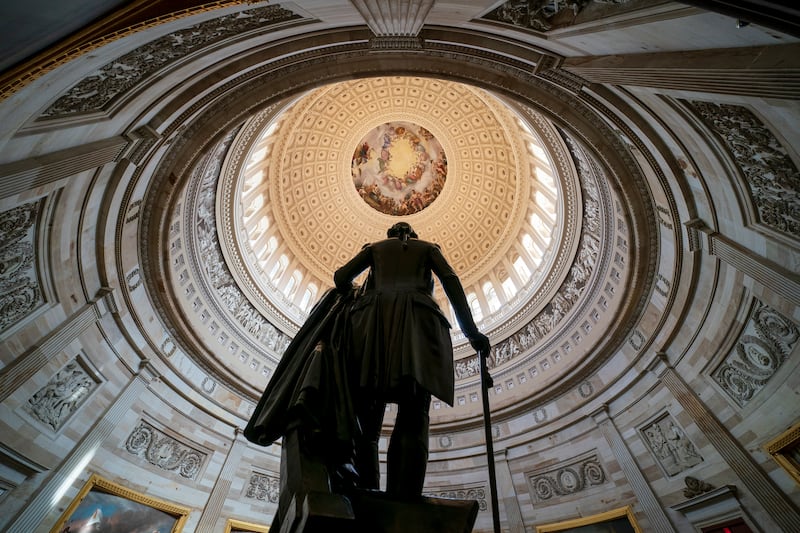In the winter of 1783, the fledgling 13 American colonies were in crisis. The Continental army had defeated the British in the Revolutionary War. However, the Continental Congress had not paid its soldiers for months, and those soldiers were on the brink of rebellion. Several of George Washington’s officers, along with several members of Congress, were plotting a military coup to take authority from Congress and to install Washington as a dictator.
On March 16, Washington surprised those plotting the coup by showing up at their meeting to address them at army headquarters in Newburgh, New York. In his remarks, he admonished them to think about their honor and their countrymen and to denounce anyone who “wishes to overturn the liberties of our country, and who wickedly attempts to open the floodgates of civil discord.”
Even though Washington was ambitious and enjoyed his fame, his humble devotion to his principles and his country proved crucial in bringing a quick end to what has since become known as the “Newburgh Conspiracy.” Later that year, in one more demonstration of his devotion to his country and his principles, he retired his commission to Congress in Annapolis.
All Americans are the beneficiaries of the character displayed by George Washington at this crucial moment in our nation’s history, providing its people the opportunity to create “a more perfect union” with a marvelous Constitution four years later. As we now contemplate our votes for political leadership at all levels, let us consider the character of those choices.
While there are a number of important considerations for any political candidate — such as policy positions, management abilities and experience — we must also consider the character of those we choose to lead us, as illustrated by our first president. I agree with the leaders of my own religious tradition, The Church of Jesus Christ of Latter-day Saints, who have counseled their members to “vote for individuals whom will act with integrity and sound judgment.” I also feel the weight of their corresponding admonition: “Latter-day Saints have a special obligation to seek out, vote for and uphold leaders who are honest, good and wise.”
In my career, I’ve been privileged to study various aspects of CEO leadership, including ethical leadership. In one study published in 2005, my colleagues Linda Trevino (Penn State University), Gary Weaver (University of Delaware) and I examined the characteristics of individuals who were identified as positive ethical role models — individuals whom our sample of dozens of business leaders thought of for inspiration when faced with ethical choices.
It is worth noting that none of our sample members thought their ethical role model was perfect. In fact, some of them even noted a flaw or two in their ethical role model. However, while we didn’t discover any perfect angels, our participants felt strongly that when it came to moral character, degree matters.
As you contemplate your votes, I invite you to consider the character traits our research revealed as common among positive ethical role models. These character traits can be grouped into four general areas: 1) interpersonal behaviors, 2) ethical actions and expectations of self, 3) fairness with others, and 4) articulation of ethical standards.
- Interpersonal behaviors. Ethical role models demonstrate care, concern and compassion for others; support and take responsibility for others; value and maintain relationships; are hardworking and helpful; tend to accentuate the positive; and are willing to accept others’ failures as long as those failures are not repeated and are made in honest pursuits.
- Ethical actions and expectations for themselves. Ethical roles are known to have honesty, integrity and trustworthiness; hold themselves to a high ethical standard; are consistently ethical in their public and private lives; accept responsibility for and are open about their own ethical failings; are humble; and sacrifice their own interests for those of others.
- Fairness with others. Ethical role models distribute resources equitably; are open and solicitous of input; respect others equally; are never condescending; and offer explanations for decisions.
- Articulation of ethical standards. Ethical role models are uncompromising and consistent in ethical values; communicate high ethical standards; hold others ethically accountable; put ethics above their own and their organizations’ interests; and take a long-term and multi-constituent perspective.
Like all of us, George Washington was a flawed individual, particularly by today’s standards. Nevertheless, his moral character provided all of us with marvelous blessings. May we each make wise choices in our selection of leaders so that we might continue to enjoy the blessings of such leadership.
Brad Agle serves as the George W. Romney Endowed Professor & Professor of Ethics and Leadership at Brigham Young University and is the lead author of “The Business Ethics Field Guide.”

